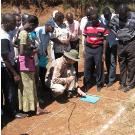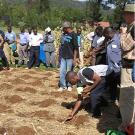Special Issue: Climate Smart Agriculture
GEF Grant | Lesotho | St. Lucia | Mozambique | Tanzania | Grenada | Fiji | CBA Resources
| Tanzania |
Adaptation Through Conservation Agriculture |
 |
Chris Enns (Canada), has been working for the past 18 months on a project in the community of Wagete in the Region of Mara, Tanzania. 4,000 community members are suffering from reduced crop yields due to unpredictable weather patterns related to climate change.
Chris decided to launch a farmer soil and water conservation program, and in August led a very comprehensive conservation agriculture workshop. You can link to a report of the workshop complete with detailed photographs of the conservation agriculture techniques they used. |
| Saint Lucia |
Adaptation, Agriculture and Livelihoods |
 |
Brenda Wilson (Saint Lucia), has been working for the past four months on a project in the community of La Pointe, Micoud, St. Lucia. 25 households are suffering from low incomes from reduced crop production due to changes in weather patterns bringing extreme weather events such as hurricanes, and an increasingly unpredictable beginning and end to rainy season.
Brenda developed this project outline to increase crop production, reduce malnutrition and improve food security among children and the community. Download Brenda’s compelling two-page fact sheet.
|
| Mozambique | Finding Climate Smart Agricultural Solutions to Famine |
 |
Phipps Campira (Mozambique), Zipo Akinyi (Kenya/New Zealand), and Lenneke Knoop (The Netherlands) have been working for the past two months on a project in the community of Mezimbite, Mozambique. 566 households (3,400 people) are frequently suffering from famine caused by a lack of knowledge of improved agricultural practices and climate change related unpredictable rain and extreme weather events.
The team developed this project outline to increase crop production, reduce malnutrition, improve food security, and reduce mortality rates among children and the community. Download their research on activity effectiveness. |
| Kingdom of Lesotho |
Climate Change and Poor Harvests |
 |
Mapale Matsela (Lesotho), Tavatya Joseph Madzvamuse (Uganda), and Nana Lupyani (Zambia) have been working for the past two months on a project in Mpharane, Lesotho. 40% of the population live below the poverty line of US $1.25 a day. 1,800 members of four villages in Mpharane are facing poor harvests due to climate change related unpredictable start of rainy season, unusual dry periods, and extreme weather events/floods.
The team developed this project outline to be able to enjoy improved nutrition and year-round food security food security through a climate smart agricultural practices program. Download their full project outline.
|
| Grenada |
Drought and Flooding: Dual Challenges |
 |
Gillian Primus (Grenada), Hanna Bartel (Canada), and Meredith Waters (US) have been working for the past year on a project on the island of Grenada; Grenada has been hit by a series of tropical hurricanes and tropical storms exhibiting increased ferocity over the past seven years. This has led to reduced crop harvests, a reduction in food security, increased malnutrition, and increased poverty.
The team originally developed this project outline to increase crop production, and are now looking for highly specific sub activities to target highly specific in-field challenges—such as drought and flood.
|
| Fiji |
Loraini Sivo Wins $40K GEF Grant Award for Project Developed in Online Course |
 |
In 2011 Loraini Sivo (Fiji) and Fatema Rajabali (UK) developed a project with a community of people in a village called Yadua. Read a description of the problem the community members faced based upon participatory needs assessment—and about their solution-oriented project design.
Says Loraini: “The course OL 341 helped me develop a concept for Yadua on a small scale ecosystem-based adaptation climate change project which was then submitted to GEF Small Grants. After a few consultation meetings with GEF, they informed me that they were willing to fund the project.”
|
| Project Resources | Best of October Online Resources for CBA Development Practitioners |
 |
FAO. This document looks at 171 scientific studies that analyze the impact of utilizing the types of techniques that we’ve been studying in our CSA course.
Routledge has announced the publication date for the New Earthscan book by Tim Magee—A Field Guide to Community Based Adaptation: December 17.
3. 7th International Community Based Adaptation Conference 18th to 25th April, 2013. Dhaka, Bangladesh. Share the latest developments in mainstreaming community based adaptation into international, national and local planning and processes. |
Learn more about design and implementing CBA projects.


